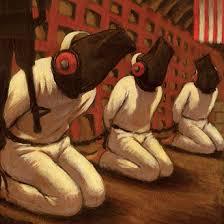 When President Barack Obama took office last year, he promised to “restore the standards of due process and the core constitutional values that have made this country great.” Toward that end, the president issued an executive order declaring that the extra-constitutional prison camp at Guantánamo Naval Base “shall be closed as soon as practicable, and no later than one year from the date of this order.” Obama has failed to fulfill his promise.
When President Barack Obama took office last year, he promised to “restore the standards of due process and the core constitutional values that have made this country great.” Toward that end, the president issued an executive order declaring that the extra-constitutional prison camp at Guantánamo Naval Base “shall be closed as soon as practicable, and no later than one year from the date of this order.” Obama has failed to fulfill his promise.
Some prisoners there are being charged with crimes, others released, but the date for closing the camp seems to recede steadily into the future. Furthermore, new evidence now emerging may entangle Obama’s young administration with crimes that occurred during the George W. Bush presidency, evidence that suggests the current administration failed to investigate seriously—and may even have continued—a cover-up of the possible homicides of three prisoners at Guantánamo in 2006.

 War Glance
War Glance Under the cover of a benign government information-gathering program, a Defense Department official set up a network of private contractors in Afghanistan and Pakistan to help track and kill suspected militants, according to military officials and businessmen in Afghanistan and the United States.
Under the cover of a benign government information-gathering program, a Defense Department official set up a network of private contractors in Afghanistan and Pakistan to help track and kill suspected militants, according to military officials and businessmen in Afghanistan and the United States. Federal investigators looking into corruption involving reconstruction in Iraq say they have opened more than 50 new cases in the past six months by scrutinizing large cash transactions made by some of the Americans involved in the nearly $150 billion rebuilding program.
Federal investigators looking into corruption involving reconstruction in Iraq say they have opened more than 50 new cases in the past six months by scrutinizing large cash transactions made by some of the Americans involved in the nearly $150 billion rebuilding program. Hours before boarding a flight out of Kabul, Norwegian diplomat Kai Eide delivered a final warning Saturday as he wrapped up his two-year tenure as the top United Nations diplomat in Afghanistan.
Hours before boarding a flight out of Kabul, Norwegian diplomat Kai Eide delivered a final warning Saturday as he wrapped up his two-year tenure as the top United Nations diplomat in Afghanistan. A new report from the New America Foundation states that one of every three people killed in the U.S.’s not-so-secret drone war in Pakistan is a civilian. The report also discloses that none of the strikes in 2009 targeted Bin Laden, and that they have had little impact on the Taliban’s ability to plan operations in Afghanistan and Pakistan.
A new report from the New America Foundation states that one of every three people killed in the U.S.’s not-so-secret drone war in Pakistan is a civilian. The report also discloses that none of the strikes in 2009 targeted Bin Laden, and that they have had little impact on the Taliban’s ability to plan operations in Afghanistan and Pakistan. "I wish it was like it was before, when I could go out with my friends and feel safe." "Before" was the 1990s — the era of Saddam Hussein, a time that many remember as almost idyllic in its safety. Unless their own families were victims of Saddam's terror, the years between 1991 and 2003 held almost no threats. Young women could go out to visit their friends in the evening, families dined at outdoor restaurants until after midnight, parks were full, and life seemed less precarious
"I wish it was like it was before, when I could go out with my friends and feel safe." "Before" was the 1990s — the era of Saddam Hussein, a time that many remember as almost idyllic in its safety. Unless their own families were victims of Saddam's terror, the years between 1991 and 2003 held almost no threats. Young women could go out to visit their friends in the evening, families dined at outdoor restaurants until after midnight, parks were full, and life seemed less precarious Six years after the intense fighting began in the Iraqi town of Fallujah between US forces and Sunni insurgents, there is a disturbingly large number of cases of birth defects in the town. Fallujah is less than 40 miles (65km) from Baghdad, but it can still be dangerous to get to.
Six years after the intense fighting began in the Iraqi town of Fallujah between US forces and Sunni insurgents, there is a disturbingly large number of cases of birth defects in the town. Fallujah is less than 40 miles (65km) from Baghdad, but it can still be dangerous to get to.






























